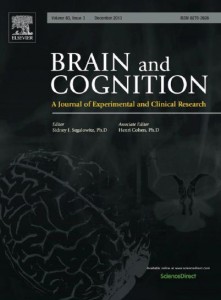NSU Newsroom
SharkBytes
Horizons
This version of NSU News has been archived as of February 28, 2019. To search through archived articles, visit nova.edu/search. To access the new version of NSU News, visit news.nova.edu.
This version of SharkBytes has been archived as of February 28, 2019. To search through archived articles, visit nova.edu/search. To access the new version of SharkBytes, visit sharkbytes.nova.edu.
Research Authored by Farquhar College of Arts and Sciences Associate Professors, Students Published in Prestigious Journal
 An article co-authored by two faculty members, a graduate student, and alumna from the Farquhar College of Arts and Sciences was published in the journal Brain and Cognition, Volume 83, Issue 3 (Dec. 2013).
An article co-authored by two faculty members, a graduate student, and alumna from the Farquhar College of Arts and Sciences was published in the journal Brain and Cognition, Volume 83, Issue 3 (Dec. 2013).
About the Research
Title: “Neurophysiological Marker of Inhibition Distinguishes Language Groups on a Non-Linguistic Executive Function Test”
Authors: Mercedes Fernandez, Ph.D., associate professor and coordinator of psychology research; Jaime Tartar, Ph.D., associate professor and coordinator of psychology research; Juliana Acosta, M.S. in Experimental Psychology student; and Daniela Padron (B.S. Biology, ’12).
The study is the first to link bilingualism to enhanced inhibitory control. Fernandez and her colleagues tested individuals who spoke only English (monolinguals) or Spanish and English (bilinguals) and discovered that the bilinguals showed an increase in a brain measure of frontal lobe activity during a task that was not related to language. Importantly, they also found that increased performance (fluency) in the second language was associated with more robust increases in this frontal lobe brain measure. The frontal lobe is important in attention focusing and planning and is also the first to decline with increasing age. Accordingly, this study suggests that speaking two languages offers an advantage that goes beyond language ability, and possibly offers a protective effect in the aging brain.
Fernandez has studied and presented on the possible benefits of bilingualism on the brain for several years. She earned a 2010–2011 President’s Faculty Research and Development Grant at NSU, as well as a Farquhar College of Arts and Sciences Dean’s Mini Grant to study the cognitive effects of bilingualism.
Read More Online
—View the article in Brain and Cognition | Dec. 2013
—View a College Spotlight on Mercedes Fernandez | Aug. 2010